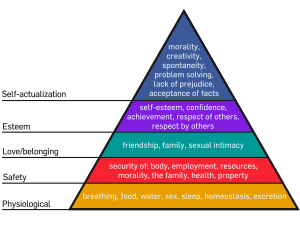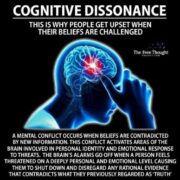Happiness for Dummies – W. Doyle Gentry, PhD

Maslow’s hierarchy of needs. Resized, renamed, and cropped version of File:Mazlow’s Hierarchy of Needs.svg. (Photo credit: Wikipe
It’s been a while since I posted in this blog, mostly because I didn’t want to supersede the last blog post, Learning: the Key to Enjoying Life. But, I started reading the book, “Happiness for Dummies”, and figured I’d post what I’ve gleaned. I’ve also put this on the www.timetoplay.com forum if you want to participate in the book review / discussion there. . .
I figured this book would be kind of fun and light — it’s not. The author summed up the book’s intention in the introduction: “Happiness for Dummies tells you how to fight for, create, and live a long and happy life. It makes you the master of your own happy destiny!” The book appears to be educational and thought provoking. The author (based on what I have read so far) has provided examples of happy people and ways to identify, learn, experience, and change. By the way — he’s noted Type B personalities are happier than Type A. I’m a type A. I expect a lot from myself. Hmmmmm. Something to consider as we go through this book.
LEARN — here’s that concept again. I’ve decided the key to enjoying life is to learn. Don’t just sit there. Identify what you need and then learn. Find out all the information you need to change, and then implement it. In the introduction the author also included this sentence re: happiness and its pursuit: “You wait for it to find you instead of exercising your right to pursue it”. Let’s not wait. Let’s learn and implement.
OK — so, let’s start the Happiness for Dummies discussion.
This is CHAPTER 1: Anyone Can Be Happy — and it’s going to be long.
Beginning on page 12, Dr. Gentry reviewed findings on 4 people who professed to be happy. Their common attributes were a strong family and parents who loved them and taught them to be positive. They volunteer and give back to others. They SMILE an encourage others around them to smile back. They are POSITIVE thinkers (that was worth repeating). One interviewee said he looks for opportunities to be happy and that he has a motto “only you can make it happen!” (p. 13). He also goes to bed each night reflecting on the positive things he did that day and wakes up each morning thinking positive thoughts. We’ve heard about being grateful and feeling grateful and making lists like these before. . . maybe something to implement? These people all participated in religious services. One said his wife taught him to loosen up and enjoy life and see the glass half full instead of half empty. The author summarized that they all believe happiness is something you have to work at — it doesn’t just happen. So, that’s definitely important to consider — all hope’s not lost, right? Another points re: the commonalities of these people that Dr. Gentry interviewed — people believe happiness comes with age. He went on to review statistics on p. 15, where 28% of people 18 – 27 felt happy whereas 38% of people 68-77 felt happy. He noted that people who are older realize that life’s not perfect, they realize you have to accept it for what it is. I guess that means they don’t put as much pressure on themselves as people who are younger do. They’ve accepted things for what they are. . .
Dr. Gentry briefly introduced that married people are happier, something that will be embellished in chapter 16 and chapter 20 — so we’ll get to that shortly.
Dr. Gentry discussed Maslow’s hierarchy of needs. Something I remember studying in college. Now I wish I paid more attention! I’m going to interpret the hierarchy of needs to being a journey — 5 levels that Dr. Maslow identified — 1) meeting your basic survival needs; 2) safety — including financial (see? timetoplay.com philosophy is on the ball! if you don’t have money, at least to eat, you can’t enjoy life); 3) feeling loved and needed by others; 4) having self-esteem – liking yourself and feeling respected; and 5) feeling like you got “there”, that you’ve reached your full potential. Maybe people get stuck and #5. I know, since starting timetoplay.com, I’ve realized I had been stuck at #5, not feeling like I had made “it”, evaluating my situation and feeling like I still have to strive or prove something to myself. I know this feeling was based in my childhood. That’s a story for another time. Like Mr. Tolle, Dr. Gentry notes that you cannot look for happiness in power, status, wealth and success. That if this is how you’re trying to get to happiness you will end up being unhappy. I realize that now and have, through the learning journey of developing timetoplay, have been learning to enjoy life and live in the moment. It’s not been easy. It’s a process, right?
Dr. Gentry goes on to discuss how negative emotions narrow your thinking and cause frustration, how positive produces a “high”, feelings of excitement, and an increase of productivity. He discusses the importance to release positive endorphins through creative activity, exercise, fellowship with others, prayer, laughter (noted to be very effective for pain management and healing, too!), being surrounded by things of beauty and healthy sexual encounters (I know people are thinking about that last one).
This was a great tip — replacing negative emotions with positive emotions. It was noted that you cannot feel angry, upset or sad if you replace it with a positive feeling, that you can’t be angry and happy at the same time. DEFINITELY a good tip that all of us can easily try.
Blood pressure: Being angry or upset can increase blood pressure. We have heard that this can cause heart attack and stroke, too. Our minds can do terrible things to our body, causing depression and sickness — Dr. Gentry referenced a study by Dr. Barbara Fredrickson who wrote a thesis on how positive emotions can undo the effects of stress, how the simple use of touch or petting a pet can decrease blood pressure. Something to look into. . .
Dr. Gentry discussed being mindful and staying in the present moment. We did learn a lot from reading The Power of Now by Eckhart Tolle — if you haven’t read the forum/discussion on that, it is available in the book club/review section. Over 2600 people have gone into that thread, and I hope it’s helped them. I realize it’s very hard to implement this all the time. The intention is to be aware of your feelings at each moment and to change things to stay positive, to focus on how you feel, to not worry, not wait for things to happen (to make them happen), to not dwell in the past or the future because all you really have is the present moment. There is no past and the future isn’t guaranteed. Pretty pensive, right? Again, I realize I forget to stay in the present. I have to be more mindful of this. And, regarding lingering in the present moment, Dr. Gentry discusses on p. 22/23 about Type A personalities always moving forward because we have too much to accomplish. Since starting TimetoPlay.com I’ve realized this has always been me. Not taking a few minutes to see the beauty around me, to appreciate what I have, what is happening, just being present. This is not something I know I can snap my fingers and make happen. It’s a constant realization that I have to be present to absorb, enjoy, reflect. I have been trying to be more aware. I was driving the other day and realized the beauty of the blue sky, I have been noticing the buds on the trees and the way the trees and plants are becoming ready to “pop” with splendor for the spring. I noticed how pretty my daughter’s hair looked the other day. The little things. The things we miss when we’re rushing around. Dr. Gentry suggested allowing time in your busy day for a few moments of happiness. This, as well, is the timetoplay.com philosophy. Even if you can only take 5 minutes for another cup of coffee to enjoy. . . something. . . and, although I forget EVERY day to do this, I’m definitely doing it more.
Last thing for chapter 1 — something to really consider — Dr. Gentry gave an example of a man who had an abusive childhood home with alcoholic parents. He had an underlying protective mechanism that he wasn’t able to be happy because if he started to be happy, his happiness could be taken away. This was because of his explosive childhood situation. In summary, sometimes past experiences might prevent you from letting yourself enjoy life. It’s something that, after a bit of self-reflection and realization, you might need to speak with a mental-health professional to work through. I realize I had been angry for 30 years — not on the surface, but, apparently it was there. Hence the reason I had to “make it”. I never did go to a psychologist, but it is something to consider. While based on Mr. Tolle’s book, we’re not supposed to dwell in the past, I do feel that it’s important to realize that, sometimes, it’s not easy to let things go, that we’re terribly hurt deep down. However, it’s not something that should hold us back. One of the goals for timetoplay is that, in the end, we should have no regrets. That we need to enjoy life. It stands to reason that, if you live in the past and dwell on that situation, regrets will be forefront in your life. So, this goes back to learning what we need and getting the resources to change.
So much for “Happiness for Dummies” being a light, fun book. This one’s definitely going to be work, too. You would never guess it from the title as it certainly minimizes things, but I think it will be time well spent.
# # #
Embrace the www.timetoplay.com philosophy: you have to be happy, healthy, have money and a work life balance to have quality of life. It’s time to enjoy life!


I “followed” your blog. Please also follow mine. I like to collaborate with like minded people. Together we can do great things.